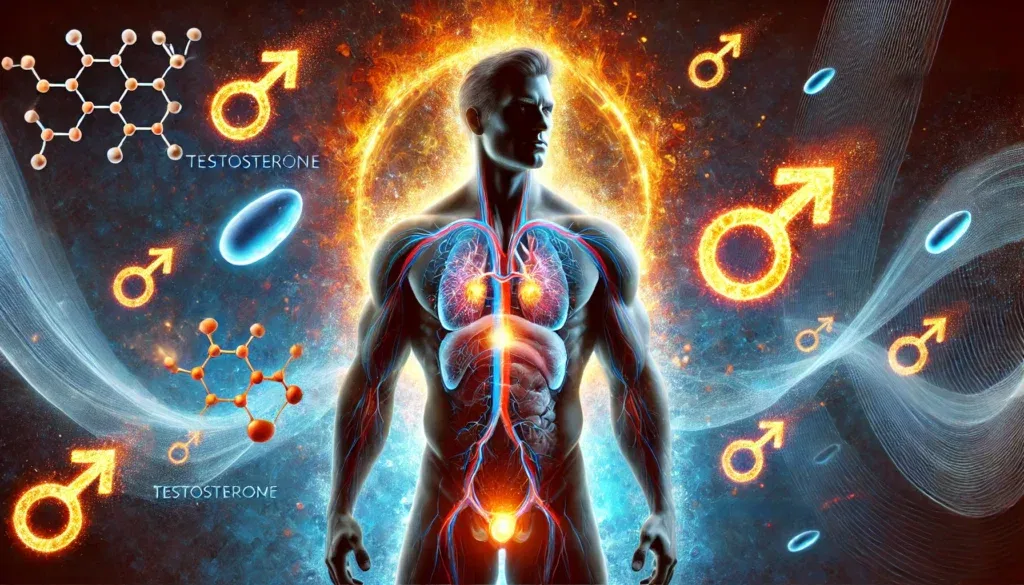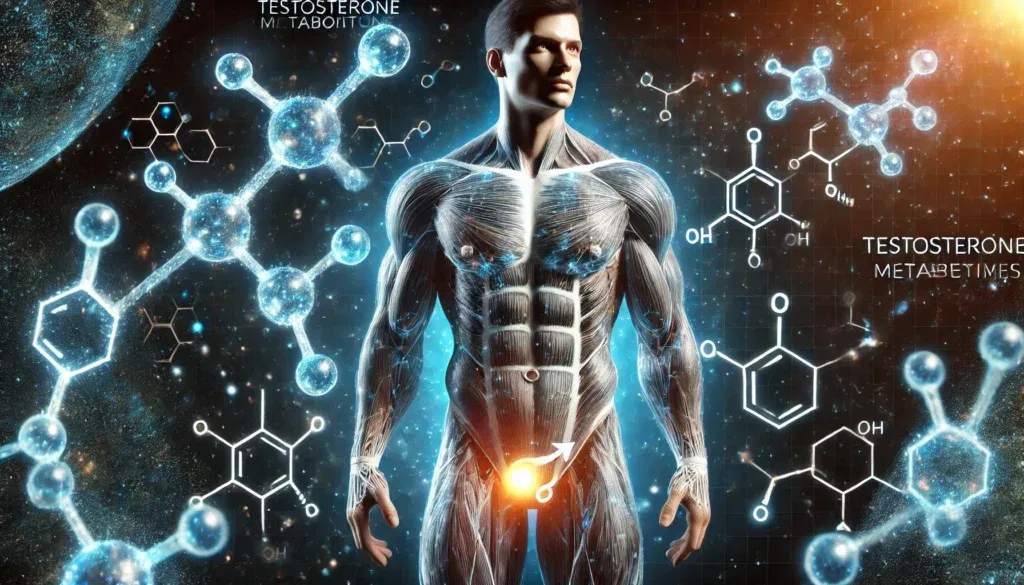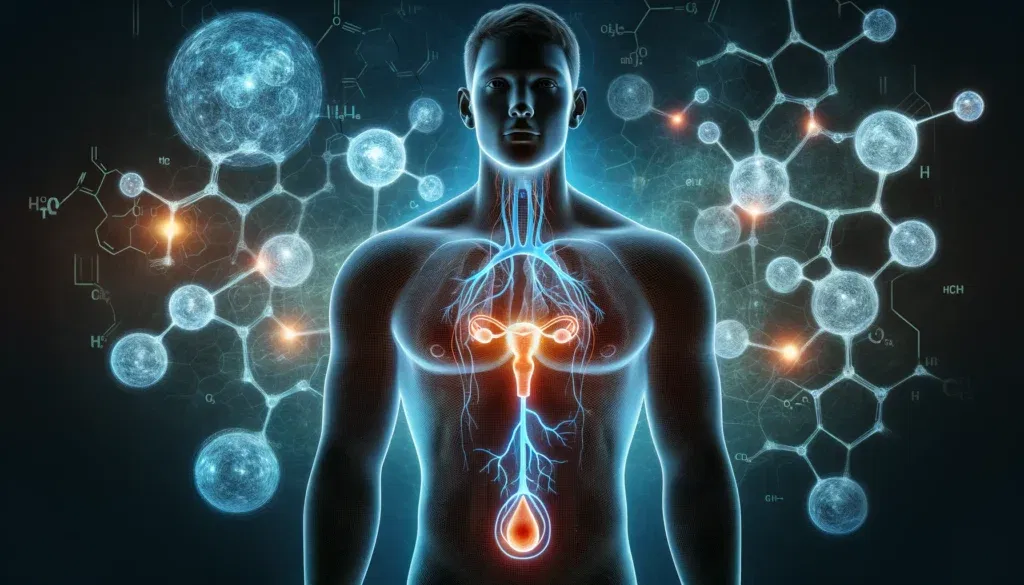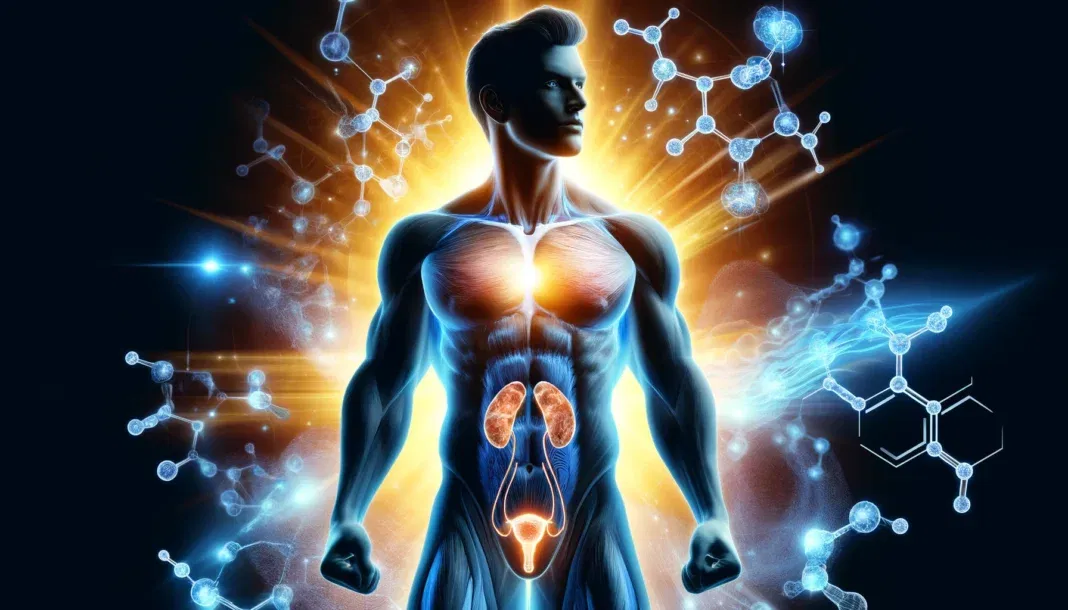Testosterone is widely recognized as the principal male sex hormone, playing an essential role in various physiological functions, from muscle growth to bone density and libido. However, one of the more intriguing aspects of testosterone’s role in the body is its potential impact on metabolism. The question of “does testosterone increase metabolism?” has generated considerable interest among researchers, health professionals, and individuals concerned with weight management and metabolic health. Understanding how testosterone metabolism functions and how testosterone metabolites interact with different systems in the body can provide a clearer picture of this complex relationship.
You ma also like: How to Increase Testosterone Levels Naturally: Science-Backed Strategies for Men’s Health & Longevity
The Role of Testosterone in the Body
Testosterone is primarily produced in the testes in men and in smaller amounts in the adrenal glands and ovaries in women. It influences several physiological processes, including the development of male reproductive tissues, increased muscle and bone mass, and the regulation of fat distribution. Beyond these traditional functions, testosterone plays a key role in energy balance and metabolic efficiency. It has been linked to the body’s ability to utilize energy, regulate insulin sensitivity, and modulate fat storage, making it a critical hormone in metabolic health.
The production and regulation of testosterone are controlled by the hypothalamic-pituitary-gonadal (HPG) axis. The hypothalamus releases gonadotropin-releasing hormone (GnRH), which signals the pituitary gland to release luteinizing hormone (LH) and follicle-stimulating hormone (FSH). These hormones stimulate the testes to produce testosterone. The balance of testosterone in the bloodstream is tightly regulated by negative feedback mechanisms to ensure optimal physiological function.

Testosterone Metabolism and Its Pathways
The metabolism of testosterone occurs primarily in the liver, where it undergoes conversion into various metabolites that exert distinct effects on the body. The two primary enzymes involved in testosterone metabolism are 5-alpha reductase and aromatase. These enzymes transform testosterone into different biologically active forms, influencing a range of physiological outcomes.
5-alpha reductase converts testosterone into dihydrotestosterone (DHT), a more potent androgen that binds to androgen receptors with higher affinity. DHT plays a crucial role in male sexual development, prostate health, and hair growth, but excessive levels have been linked to conditions such as benign prostatic hyperplasia (BPH) and male pattern baldness. On the other hand, aromatase converts testosterone into estradiol, a form of estrogen that is essential for bone density and cardiovascular health. This conversion is particularly important in men, as estradiol contributes to the regulation of fat metabolism and insulin sensitivity.
The liver further metabolizes testosterone into inactive forms that are excreted in the urine and bile. The efficiency of testosterone metabolism varies among individuals, influenced by genetic factors, age, lifestyle, and overall health status. Understanding these metabolic pathways is essential for grasping how testosterone impacts metabolism and body composition.
How Testosterone Influences Metabolic Rate
One of the most significant ways testosterone affects metabolism is through its impact on basal metabolic rate (BMR), the number of calories the body burns at rest. Testosterone enhances metabolic rate by increasing lean muscle mass, which in turn requires more energy to maintain. Studies have shown that men with higher levels of testosterone tend to have a higher BMR compared to those with lower levels.
Moreover, testosterone plays a role in mitochondrial function, the cellular structures responsible for energy production. It enhances the efficiency of mitochondrial respiration, leading to increased energy expenditure and improved metabolic health. This means that adequate testosterone levels contribute to greater calorie burning, even in the absence of physical activity.
Additionally, testosterone has been linked to enhanced fat oxidation, the process by which the body breaks down stored fat for energy. This mechanism helps prevent excessive fat accumulation and promotes a healthier body composition. Research indicates that men with low testosterone levels are more likely to experience increased fat storage, particularly in the abdominal region, which is associated with metabolic disorders such as insulin resistance and type 2 diabetes.
The Relationship Between Testosterone and Insulin Sensitivity
Insulin sensitivity refers to how effectively the body’s cells respond to insulin, a hormone responsible for regulating blood sugar levels. Impaired insulin sensitivity, also known as insulin resistance, can lead to conditions such as metabolic syndrome and type 2 diabetes. Testosterone plays a crucial role in maintaining insulin sensitivity by promoting glucose uptake in muscle cells and reducing fat accumulation, which can interfere with insulin signaling.
Several studies have demonstrated that men with low testosterone levels are more prone to developing insulin resistance, while testosterone replacement therapy (TRT) has been shown to improve insulin sensitivity and glycemic control. The mechanisms underlying this relationship include testosterone’s ability to enhance muscle glucose uptake, reduce inflammation, and modulate lipid metabolism. By maintaining healthy testosterone levels, individuals may reduce their risk of metabolic disorders and support overall metabolic function.
Testosterone and Fat Distribution
Testosterone influences where fat is stored in the body, with higher levels promoting fat loss in the abdominal region while preserving lean muscle mass. Men with low testosterone often experience increased fat accumulation, particularly in visceral fat deposits, which are strongly associated with metabolic diseases. Visceral fat is metabolically active and releases inflammatory cytokines that contribute to insulin resistance, cardiovascular disease, and other health complications.
The redistribution of fat with declining testosterone levels is particularly evident in aging men, who often experience an increase in body fat percentage along with a reduction in muscle mass. Testosterone therapy has been studied as a potential intervention for reversing these effects, with research suggesting that it can lead to significant reductions in fat mass and improvements in lean body composition.
The Impact of Exercise and Lifestyle on Testosterone Metabolism
While testosterone plays a vital role in metabolism, its effects can be enhanced or diminished by lifestyle factors such as physical activity, diet, sleep, and stress management. Resistance training, for example, has been shown to naturally boost testosterone levels by stimulating muscle growth and hormonal balance. High-intensity interval training (HIIT) and compound movements such as squats and deadlifts have been particularly effective in increasing testosterone production.
Diet also plays a critical role in testosterone metabolism. Consuming adequate amounts of protein, healthy fats, and micronutrients such as zinc and vitamin D can support optimal testosterone levels. On the other hand, diets high in processed foods, refined sugars, and excessive alcohol consumption can negatively impact hormonal balance and metabolic function.
Sleep is another crucial factor in testosterone regulation. Poor sleep quality and insufficient rest have been linked to reduced testosterone levels and impaired metabolic health. Chronic stress, which leads to elevated cortisol levels, can also disrupt testosterone production and contribute to metabolic dysfunction. By adopting a healthy lifestyle that prioritizes exercise, nutrition, sleep, and stress management, individuals can support testosterone metabolism and overall well-being.

Frequently Asked Questions (FAQ) on Testosterone Metabolism
1. How does testosterone metabolism affect overall health?
Testosterone metabolism plays a crucial role in multiple physiological processes, including muscle growth, fat distribution, bone density, and cognitive function. Efficient testosterone metabolism ensures that the hormone is properly utilized and converted into its active forms, such as dihydrotestosterone (DHT) and estradiol, which influence different aspects of health. Imbalances in testosterone metabolism can lead to unwanted symptoms like fatigue, reduced muscle mass, and increased body fat. Additionally, inefficient testosterone metabolism may contribute to metabolic disorders, such as insulin resistance and obesity. Optimizing testosterone metabolism through lifestyle interventions, such as strength training, proper nutrition, and sleep optimization, can improve overall well-being.
2. Does testosterone increase metabolism and support weight management?
Yes, testosterone has been shown to increase metabolism by enhancing the body’s ability to burn fat and utilize energy efficiently. The hormone interacts with muscle cells to promote protein synthesis and muscle growth, which in turn increases basal metabolic rate (BMR). Research suggests that individuals with higher testosterone levels tend to have a more active metabolism, which helps regulate body composition and prevent excessive fat accumulation. However, does testosterone increase metabolism equally in all individuals? Not necessarily—genetics, age, and lifestyle factors all influence the extent to which testosterone impacts metabolic function. Proper management of testosterone levels through exercise and diet can optimize metabolism and promote long-term weight maintenance.
3. What are testosterone metabolites, and why are they important?
Testosterone metabolites are the byproducts produced when testosterone is metabolized in the body. The primary testosterone metabolites include dihydrotestosterone (DHT) and estradiol, both of which have unique physiological effects. DHT is a potent androgen that influences hair growth, prostate health, and libido, whereas estradiol plays a vital role in bone density and cardiovascular function. Testosterone metabolites also contribute to the balance between anabolic (muscle-building) and catabolic (muscle-breaking) processes. Understanding how testosterone metabolites function can help in diagnosing hormonal imbalances and optimizing treatment approaches for those experiencing symptoms related to low or excessive testosterone levels.
4. Can lifestyle changes enhance testosterone metabolism?
Yes, lifestyle modifications can significantly influence testosterone metabolism and hormone balance. Resistance training and high-intensity interval training (HIIT) have been shown to boost testosterone levels and improve its metabolism. A diet rich in healthy fats, lean proteins, and micronutrients like zinc and magnesium can further support testosterone metabolism. Sleep quality also plays a key role—poor sleep can disrupt hormonal balance and reduce the body’s ability to metabolize testosterone effectively. Additionally, stress management through mindfulness and relaxation techniques can prevent excessive cortisol production, which may interfere with testosterone metabolism and overall hormonal harmony.
5. Does testosterone increase metabolism in older adults?
Aging naturally leads to a decline in testosterone levels, which can contribute to a slower metabolism and increased fat accumulation. However, does testosterone increase metabolism in older individuals the same way it does in younger people? Research indicates that while the metabolic effects of testosterone may be less pronounced with age, maintaining optimal testosterone levels can still support muscle mass retention, energy levels, and fat metabolism. Hormone replacement therapy (HRT) or natural interventions like strength training and proper nutrition can help older adults optimize their testosterone metabolism and maintain a healthy metabolic rate.
6. How do testosterone metabolites influence muscle growth and recovery?
Testosterone metabolites, particularly DHT, play a significant role in muscle growth and recovery. DHT binds to androgen receptors in muscle tissue, enhancing protein synthesis and promoting muscle hypertrophy. Additionally, estradiol, another key testosterone metabolite, contributes to muscle repair by regulating inflammation and muscle regeneration. An imbalance in testosterone metabolites can lead to slower recovery times, decreased muscle mass, and increased risk of injuries. Proper training strategies, combined with dietary support and adequate testosterone metabolism, ensure that muscle recovery remains efficient and effective.
7. What factors can impair testosterone metabolism?
Several factors can negatively impact testosterone metabolism, leading to hormonal imbalances and associated symptoms. Chronic stress and high cortisol levels can interfere with the enzymatic pathways responsible for testosterone conversion. Poor dietary choices, such as excessive sugar or alcohol intake, may reduce testosterone production and impair its metabolism. Sleep deprivation disrupts the hormonal signaling necessary for efficient testosterone metabolism. Furthermore, exposure to endocrine-disrupting chemicals (EDCs) found in plastics and processed foods can inhibit testosterone function and its metabolic pathways. Addressing these factors is crucial for maintaining a balanced hormonal profile.
8. Does testosterone increase metabolism in women as well?
Although testosterone is often associated with male physiology, it plays an essential role in female health, including metabolic function. Does testosterone increase metabolism in women the same way it does in men? While women naturally produce lower levels of testosterone, the hormone still supports muscle maintenance, fat metabolism, and energy balance. Low testosterone in women can lead to decreased metabolic efficiency, increased fat accumulation, and reduced physical performance. Addressing hormonal imbalances through exercise, nutrition, and medical evaluation can help women optimize their testosterone metabolism for improved metabolic health.
9. How do testosterone metabolites affect cardiovascular health?
Testosterone metabolites, particularly estradiol, have significant implications for cardiovascular health. Estradiol helps regulate cholesterol levels, arterial flexibility, and blood flow, which are essential for heart health. Imbalances in testosterone metabolism that lead to excessively high or low estradiol levels may contribute to cardiovascular risk factors, such as hypertension or arterial plaque buildup. Maintaining proper testosterone metabolism through lifestyle interventions and, when necessary, medical guidance can support overall cardiovascular function. Understanding the role of testosterone metabolites in heart health can aid in preventing age-related cardiovascular conditions.
10. What emerging research exists on testosterone metabolism?
Recent studies are exploring new ways to optimize testosterone metabolism for improved health outcomes. Researchers are investigating the role of gut microbiota in testosterone metabolism, suggesting that certain probiotics may enhance hormonal balance. Advances in genetic testing allow for personalized insights into how an individual metabolizes testosterone, potentially leading to customized treatment approaches. Additionally, novel therapies, such as selective androgen receptor modulators (SARMs), are being studied for their potential to enhance testosterone metabolism while minimizing side effects. Keeping up with emerging research in testosterone metabolism can provide new opportunities for optimizing hormone health and metabolic function.

Conclusion: The Connection Between Testosterone and Metabolism
The question “does testosterone increase metabolism?” can be answered with a resounding yes, as evidence suggests that testosterone plays a pivotal role in metabolic health. Through its effects on muscle mass, fat distribution, insulin sensitivity, and mitochondrial function, testosterone contributes to energy balance and metabolic efficiency. Understanding testosterone metabolism and the role of testosterone metabolites provides valuable insights into how this hormone influences overall health.
Maintaining optimal testosterone levels through lifestyle interventions, including regular exercise, a nutritious diet, adequate sleep, and stress management, can support metabolic health and prevent age-related metabolic decline. For those experiencing symptoms of low testosterone, medical consultation and potential therapeutic interventions such as TRT may be beneficial. As research continues to uncover the intricate connections between testosterone and metabolism, a comprehensive approach to hormonal health will remain essential for longevity and vitality.
testosterone levels and metabolism, hormone balance and fat loss, testosterone and insulin sensitivity, muscle growth and testosterone, testosterone replacement therapy benefits, natural ways to boost testosterone, impact of testosterone on weight loss, metabolic effects of testosterone, testosterone and energy levels, testosterone and fat distribution, hormonal health for men, testosterone and aging, optimizing testosterone naturally, testosterone therapy and metabolism, testosterone and exercise performance, diet for healthy testosterone levels, testosterone deficiency and weight gain, testosterone and mitochondrial function, testosterone and cardiovascular health, boosting metabolism with testosterone
Further Reading:
Testosterone: a metabolic hormone in health and disease
Disclaimer: The information provided in this article is for general informational purposes only. The content does not constitute professional advice of any kind, including but not limited to medical, legal, or financial advice. HisHealthMag and its contributors make no representations or warranties regarding the accuracy, completeness, or reliability of the information presented. Always seek the advice of a qualified professional for any specific concerns or questions you may have. Neither HisHealthMag nor its authors assume any responsibility or liability for any actions taken based on the information provided in this article. The views and opinions expressed are those of the author(s) and do not necessarily reflect the official policy or position of HisHealthMag.





